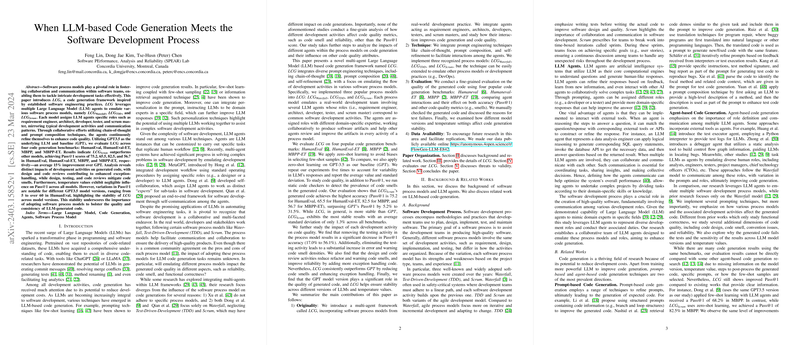Analyzing the Impact of Software Process Models on LLM-Based Code Generation
The integration of LLMs in code generation tasks represents a progression in automating software development activities. The paper "When LLM-based Code Generation Meets the Software Development Process" proposes a diversified approach in harnessing LLMs, specifically through the development of the LCG framework. This framework utilizes multiphasic agent-driven models to simulate traditional software development processes, namely Waterfall, Test-Driven Development (TDD), and Scrum. Each of these models enlists LLM agents in roles akin to real-world software engineering professions: requirement engineers, architects, developers, testers, and scrum masters, facilitating a simulated collaborative environment to improve code generation outputs.
Framework and Methodology Overview
The LCG framework extends beyond conventional prompting methods, assigning LLM agents distinct roles and tasks that accord with chosen development methodologies. In their paper, Lin et al. implemented a systematic role-implementation architecture, ensuring agents distinctly operate within their domains. Moreover, the framework employs advanced techniques such as chain-of-thought reasoning, prompt composition, and self-refinement to adaptively enhance code outputs iteratively. Notably, the work emphasizes zero-shot learning to eschew biases inherent in few-shot sample selections.
Evaluation benchmarks such as HumanEval and MBPP, including stronger evaluation tests (HumanEval-ET and MBPP-ET), were utilized to detect the robustness of these LLM configurations. Results demonstrated substantial improvements in Pass@1 scores over a baseline (GPT-3.5), with metrics showing up to 31.5% improvement in some tests. This underlines the efficacy of implementing structured software development paradigms within LLM code generation frameworks.
Numerical and Empirical Findings
Among the three process models tested, Scrum consistently outperformed others concerning not only Pass@1 scores but also favorable code smell and exception-handling metrics. The ability of these models to maintain stability amid fluctuating model versions establishes the pragmatic advantages of employing process models in LLM-driven code generation. Comparatively, the traditional usage of GPT without structured processes exhibits significant variability, particularly when different versions of the model are assessed.
Design and code review activities uniquely facilitated a decrease in code smells and incremented exception handling, signifying enhancements in the reliability of the generated code. Test execution, unsurprisingly, emerged as the most influential activity for improving code correctness, as its removal resulted in marked drops in Pass@1 scores. These insights suggest an intertwined effect of process-structure emulation and systematic testing, contributing synergistically to elevate code quality.
Implications and Future Directions
The implications of these findings extend toward new methodologies in automated code development, where the agent-based adaptation of traditional process models aligns with agile and iterative software practices. The theoretical underpinning implies a necessity to expand upon multi-agent collaborations within AI frameworks, potentially integrating similar methodologies in broader development tasks and life cycles.
In future studies, extending these frameworks to support diverse programming languages and task complexities could help streamline LLM applicability across varying software domains. Additionally, investigating the participatory role of LLMs in more intricate development settings, such as end-to-end system design and integration, holds merit. Thus, an evolved exploration into agents-as-collaborators can redefine existing paradigms in AI software engineering research.
Considering the paper's contribution to code generation techniques, it is evident that the authors provide a strong case for using process models to support stable and quality-driven implementations of LLMs in software development tasks. This research offers a promising foundation for continuous advancements in the domain of AI-driven software engineering.
